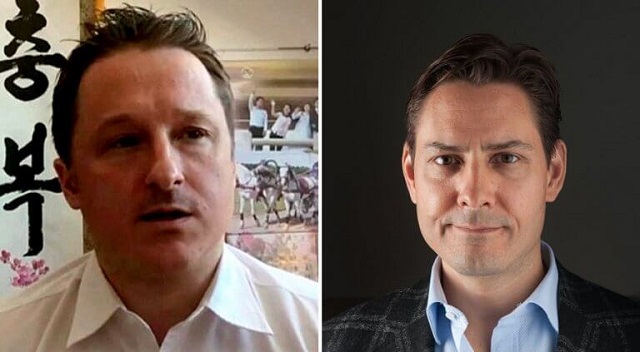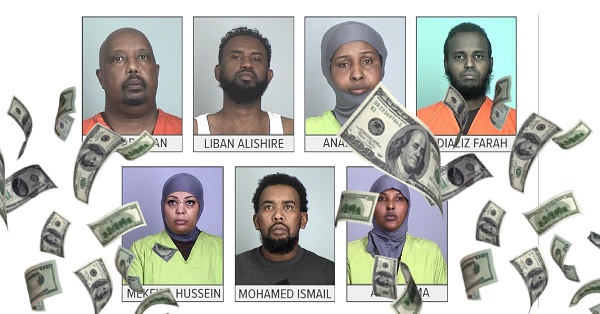Business
China likely to escape scot-free in persecution of two Canadians

From the MacDonald Laurier Institute
By Charles Burton
Beijing propagandists are already using recent claims to vindicate the appalling treatment of Michael Kovrig and Michael Spavor
There is a deep sadness to reports that Michael Spavor feels he was badly wronged by his fellow former political prisoner Michael Kovrig and, by extension, political officers at Canada’s embassy in Beijing and their masters in Ottawa.
Spavor reportedly wants millions in compensation from the Canadian government for its alleged complicity in his detention in his Chinese prison ordeal. If this ends up in court, Kovrig and his superiors would have an opportunity to defend themselves against these allegations, but Beijing propagandists are already using them to vindicate the appalling treatment of Kovrig and Spavor — a gross violation of international law — by a ruthless regime that arrested them to pressure Canada into releasing Chinese Communist Party figure Meng Wanzhou from house arrest in Vancouver.
While few specifics are known about Spavor’s claims, media reports depict a connection to Kovrig’s former job at Canada’s embassy in Beijing, and later with the International Crisis Group think tank, roles in which he would allegedly meet with people in China, engage them in his fluent Mandarin, and mine the conversations for nuggets of insight into China’s political or economic affairs.
Chinese authorities, of course, don’t like such activities. One expects that Kovrig and his superiors, both in government and the ICG, would have been well aware that this type of work would irritate Beijing, thus the danger of arbitrary detention on trumped-up charges was always there whenever he visited China without the protection of a diplomatic passport. And so it was.
One particularly troubling aspect of this sort of activity is the risk it presents to people who might unknowingly be sources for these information-gathering practices. Apparently Spavor and Kovrig routinely got together for drinks and sessions of good-humoured conversation. But friendships with diplomats imply that observations shared in a bar can end up the next morning in a report to Ottawa, and on to the Five Eyes. Was this possibility lost on Spavor? Was Kovrig perhaps not as forthcoming as he could have been about the full dimensions of their chats?
And there is always the possibility that China’s Ministry of State Security has access to Canadian diplomatic communications, which led them to open a file on the two.
Spavor ran a business, Paektu Cultural Exchange, that facilitated sports, cultural, tourism and business exchanges with North Korea. These pricey tours necessitated the transfer of badly-needed foreign currency into North Korea, arguably helping to enable the repressive Pyongyang regime. Perhaps more intriguing, in the course of his work Spavor developed an unlikely rapport with the third-generation Kim family dictator, Kim Jong Un, and was photographed jet-skiing and drinking cocktails with him on a private yacht. It is very plausible that China strongly disapproved of their junior proxy Korean communist dictator cavorting with non-Chinese foreign friends, hence his arrest.
Troublingly, Canadians — who were transfixed and infuriated by the two Michaels’ incarceration — have had little news about Kovrig and Spavor’s China nightmare since their sudden release in September 2021, just hours after Canada released Meng. One wonders if Ottawa really did enough to incentivize China’s Communist authorities to send them home sooner, or if there were other factors in Canada’s murky relationship with Beijing that took priority over what was perhaps downplayed behind closed doors as just another consular matter, one of many that are de facto subordinated to trade and political interests.
We may never see any Global Affairs Canada officials or former diplomats giving public evidence in a Canadian court to defend against Spavor’s accusation. To be sure, much of what goes on between Canada and China — indeed, within our own government internally — is kept from us by the secretive walls of the Security of Information Act.
Perhaps Spavor will be given a big whack of taxpayer money in an out-of-court settlement laced with ironclad nondisclosure provisions. One thing is for sure though. The Chinese authorities who so brutally persecuted him will, as usual, get off scot-free.
Charles Burton is a senior fellow at the Macdonald-Laurier Institute, non-resident senior fellow of the European Values Center for Security Policy in Prague, and former diplomat at Canada’s embassy in Beijing.
Business
Feds pull the plug on small business grants to Minnesota after massive fraud reports

The Small Business Administration is moving to freeze grant money flowing into Minnesota after explosive allegations of large-scale fraud tied to state oversight failures, with SBA Administrator Kelly Loeffler signaling an immediate crackdown following recent independent reporting.
In a series of comments shared publicly by conservative commentator Benny Johnson, Loeffler said the agency is “cutting off and clawing back” SBA grants to the state while investigators dig deeper into what she described as a rapidly expanding fraud network.
Johnson wrote that Loeffler told him she was “disgusted and sickened” after reviewing footage from YouTuber Nick Shirley, whose on-the-ground reporting in Minnesota highlighted what he said were sham daycare and learning centers collecting millions in public funds despite showing little or no sign of legitimate operations.
According to Johnson, Loeffler blamed the situation on Democrat Gov. Tim Walz, accusing his administration of refusing to enforce basic rules governing small businesses and allowing fraud to flourish unchecked.
Johnson said Loeffler told him SBA investigators were able to identify roughly half a billion dollars in suspected fraud within days of focusing on Minnesota, calling the operation an “industrial-scale crime ring” that ripped off American taxpayers.
“Pending further review, SBA is freezing all grant funding to the state in order to stop the rampant waste of taxpayer dollars and uncover the full depth of fraud,” Loeffler said, according to Johnson’s account, adding that the total scope of the scheme remains unknown and could reach into the billions.
The controversy gained national traction after Shirley posted video of himself visiting multiple facilities, including a South Minneapolis site known as the Quality Learning Center, which he reported was approved for federal aid for up to 99 children but appeared inactive during normal business hours.
The center’s sign, Shirley noted, even misspelled the word “learning” as “learing.”
In the footage, a woman inside the building is heard shouting “Don’t open up,” falsely claiming Shirley and his colleague were Immigration and Customs Enforcement agents.
After the video circulated, Rep. Tom Emmer, a Republican, publicly demanded answers from Walz, questioning how such facilities were approved for millions in taxpayer funding.
Shirley’s reporting followed earlier investigations, including a November report by City Journal alleging that members of Minnesota’s Somali community had sent millions of dollars in stolen taxpayer funds overseas, with some of that money reportedly ending up in the hands of Al-Shabaab, a U.S.-designated terrorist organization.
While Walz’s administration has insisted it takes fraud seriously, the SBA’s decision to halt grant funding marks one of the most aggressive federal responses yet, underscoring how rapidly a local scandal has escalated into a national reckoning over oversight, enforcement, and accountability in Minnesota.
Business
Stripped and shipped: Patel pushes denaturalization, deportation in Minnesota fraud

FBI Director Kash Patel issued a blunt warning over the weekend as federal investigators continue unraveling a sprawling fraud operation centered in Minnesota, saying the hundreds of millions already uncovered represent “just the tip of a very large iceberg.”
In a lengthy statement posted to social media, Patel said the Federal Bureau of Investigation had quietly surged agents and investigative resources into the state well before the scandal gained traction online. That effort, he said, led to the takedown of an estimated $250 million fraud scheme that stole federal food aid intended for vulnerable children during the COVID pandemic.
According to Patel, the investigation exposed a network of sham vendors, shell companies, and large-scale money laundering operations tied to the Feeding Our Future case. Defendants named by the FBI include Abdiwahab Ahmed Mohamud, Ahmed Ali, Hussein Farah, Abdullahe Nur Jesow, Asha Farhan Hassan, Ousman Camara, and Abdirashid Bixi Dool, each charged with offenses ranging from wire fraud to conspiracy and money laundering.
Patel also said Abdimajid Mohamed Nur and others were charged in a separate attempt to bribe a juror with $120,000 in cash. He noted that several related cases have already resulted in guilty pleas, prison sentences of up to 10 years, and nearly $48 million in restitution orders.
Despite those outcomes, Patel warned the case is far from finished.
“The FBI believes this is just the tip of a very large iceberg,” he said, adding that investigators will continue following the money and that the probe remains ongoing. Patel further confirmed that many of those convicted are being referred to immigration authorities for possible denaturalization and deportation proceedings where legally applicable.
The renewed focus follows a viral video circulated by independent journalist Nick Shirley, which appeared to show multiple childcare and learning centers operating as empty or nonfunctional storefronts. The footage sparked immediate backlash from Republicans, including Vice President JD Vance.
House Majority Whip Tom Emmer accused Minnesota Gov. Tim Walz of sitting idle while massive sums were stolen from taxpayers. Walz addressed the allegations during a November press conference, before the full scope of the fraud became public, saying the scandal “undermines trust in government” and threatens programs meant to help vulnerable residents.
“If you’re committing fraud, no matter where you come from or what you believe, you are going to go to jail,” Walz said at the time.
Authorities say the alleged schemes date back to at least 2015, beginning with overbilling Minnesota’s Child Care Assistance Program and later expanding into Medicaid-funded disability and housing programs. One such housing initiative, aimed at helping seniors and disabled residents secure stable housing, was shut down earlier this year after officials cited what they described as large-scale fraud.
The fallout has already reached the federal level. Last month, President Trump announced the suspension of Temporary Protected Status for Somali nationals, arguing that Minnesota had become a hub for organized welfare fraud and money laundering activity.
-

 Digital ID2 days ago
Digital ID2 days agoCanadian government launches trial version of digital ID for certain licenses, permits
-

 Agriculture2 days ago
Agriculture2 days agoEnd Supply Management—For the Sake of Canadian Consumers
-

 Alberta2 days ago
Alberta2 days agoAlberta Next Panel calls to reform how Canada works
-

 International1 day ago
International1 day agoGeorgia county admits illegally certifying 315k ballots in 2020 presidential election
-

 Business1 day ago
Business1 day agoThe “Disruptor-in-Chief” places Canada in the crosshairs
-

 Artificial Intelligence1 day ago
Artificial Intelligence1 day agoUK Police Pilot AI System to Track “Suspicious” Driver Journeys
-

 Energy1 day ago
Energy1 day ago‘The electric story is over’
-

 International2 days ago
International2 days agoWorld-leading biochemist debunks evolutionary theory






